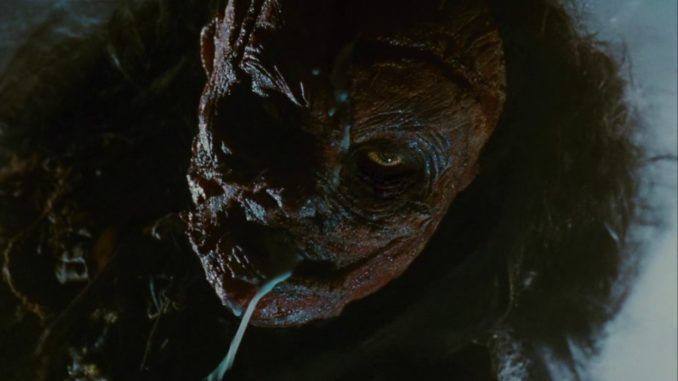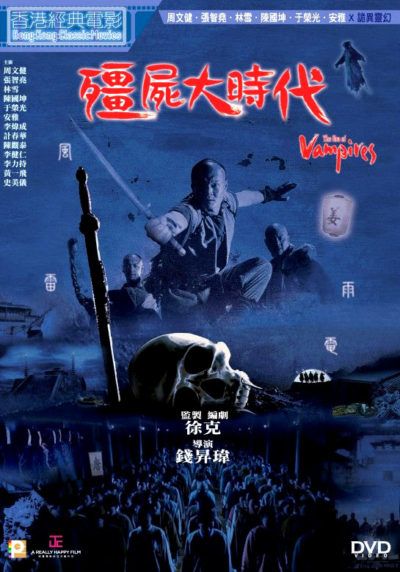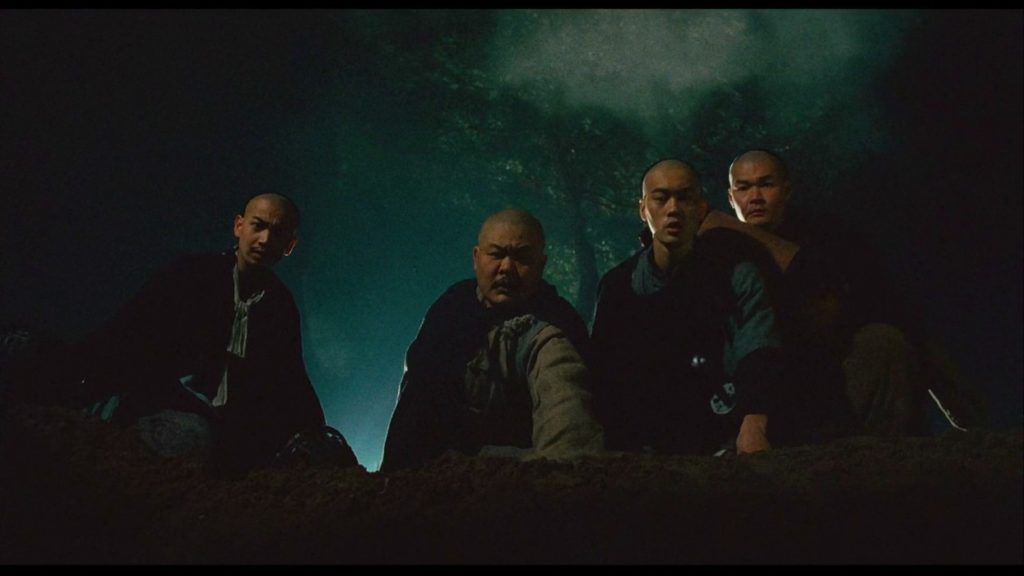
Rating: C+
Dir: Wellson Chin
Star: Ken Chang, Michael Man-Kin Chow, Suet Lam, Anya
a.k.a. Tsui Hark’s Vampire Hunters
Of course, we couldn’t have an entire month of vampires, without having an entry from one of the more off-beat branches, featuring the Chinese hopping flavour of the species. The problem is, I’d already covered the most canonical entries, when I wrote about the Mr. Vampire franchise. But this is just about a worthy enough effort. In the West, it’s better known under the alternate title, even if Tsui Hark’s credited involvement was as a producer and writer. That, however, is a severely edited-down version of the movie. It runs a mere 89 minutes, compared to the 107 of the copy I saw. I’ve not seen the edited version, which was perhaps an attempt to cash in on John Carpenter’s Vampires, and we shall not speak of it to any great degree.
The absence of Hark from the director’s chair is not necessarily a bad thing, considering he was instead directing the underwhelming Black Mask 2: City of Masks. Chin had been responsible for a number of girls-with-guns movies, including all four entries in the Inspector Wears Skirts franchise, the first of which featured Cynthia Rothrock. But for whatever reason, this proved to be almost Chin’s swansong: he’d direct only one more feature, and that wouldn’t happen for more than another decade. I’ve been unable to find out how this movie performed at the local box-office. However, the lack of any attempt at a sequel probably gives reason to think it was not a success, especially considering it can’t have been a cheap production to make by Hong Kong standards.
 It’s the story of a group of four hunters: Hei (Chang), Fat (Chow), Kung (Lam) and Choi (Danny Chan Kwok-Kwan), who are searching for the vampire king with their master Mao Shan. After a battle, the acolytes are separated, but end up at a house belonging to the Jiang family, where they are employed as temporary servants for the upcoming wedding of the family scion, while continuing to hunt their target. This will actually be Jiang Jr’s seventh marriage: the previous six brides all died, which apparently failed to make candidate #7, Sasa (Anya), reconsider her life choices. There is good reason for this, however. She’s a mole, sent there by her brother, Dragon Tang, who intends to rob the family of a stash of gold hidden inside the mansion: he first needs Susu to find out where it is.
It’s the story of a group of four hunters: Hei (Chang), Fat (Chow), Kung (Lam) and Choi (Danny Chan Kwok-Kwan), who are searching for the vampire king with their master Mao Shan. After a battle, the acolytes are separated, but end up at a house belonging to the Jiang family, where they are employed as temporary servants for the upcoming wedding of the family scion, while continuing to hunt their target. This will actually be Jiang Jr’s seventh marriage: the previous six brides all died, which apparently failed to make candidate #7, Sasa (Anya), reconsider her life choices. There is good reason for this, however. She’s a mole, sent there by her brother, Dragon Tang, who intends to rob the family of a stash of gold hidden inside the mansion: he first needs Susu to find out where it is.
Further weirdness. The corpses of the six dead brides have been preserved and are stored in the basement of the mansion, along with all the other deceased members of the Jiang clan. This becomes relevant, because Tang hires – and this is exactly what the film calls him – a “Zombie Wrangler” to animate the dead, and distract Jiang Sr. so Tang can search the place. This matters, because the head of the clan is played by Yu Rong-Guang, who was part of the amazing Iron Monkey, and hasn’t lost a step over the decade since. You certainly want him out of the way. It’s also worth noting the film seems to use “zombie” and “vampire” almost interchangeably. Both words are used for the re-animated dead, who survive by draining energy from their living victims. The king is particularly good at this.
I can kinda see why distributors decided to edit it down, as there’s certainly no shortage of… stuff going on here. I’m going to presume a particularly bizarre ending was one of the parts that was dropped on the Western cutting-room floor. Even before this, I can’t say much of it perfect sense: for instance, I just read that, apparently, three months passed between the quarter losing their master and showing up at the Jiang house. This was certainly not clear. The emotional impact is limited, due to the less than stellar effort put into the characters. There is, for example, no need at all for there to be four acolytes, and the movie more or less consigns three of them to being barely even supporting characters. Hei, who falls for Sasa, is the only one given motivation until the big finale, where everyone teams up to fight the vampire monarch one more time.
 What the film does well – and this is likely not going to be a surprise – is the action scenes, which range from competent to top tier stuff. My only complaint would be the use of digital effects, which haven’t aged well, and probably weren’t very good in 2003 to start with. But the straightforward kung-fu, whether or not it’s wire-assisted, is every bit as good as you would expect. As well as Yu, Horace Lee’s Dragon Tang proves to be especially a standout on that front. I’m not sure if there was actually anyone “playing” the vampire king: he’s buried beneath so much latex make-up, it could feasibly have been a department store mannequin, and nobody would have been any the wiser. It certainly doesn’t have much less motivation or complexity than most of the humans.
What the film does well – and this is likely not going to be a surprise – is the action scenes, which range from competent to top tier stuff. My only complaint would be the use of digital effects, which haven’t aged well, and probably weren’t very good in 2003 to start with. But the straightforward kung-fu, whether or not it’s wire-assisted, is every bit as good as you would expect. As well as Yu, Horace Lee’s Dragon Tang proves to be especially a standout on that front. I’m not sure if there was actually anyone “playing” the vampire king: he’s buried beneath so much latex make-up, it could feasibly have been a department store mannequin, and nobody would have been any the wiser. It certainly doesn’t have much less motivation or complexity than most of the humans.
To be completely honest, my interest kinda waxed and waned over the course of proceedings, to the point that I got into a rhythm. As soon as there was any dialogue, it was a good time to go to the bathroom, get some snacks, wonder where our new kitten had gone, or surf the Internet on my phone (specifically: looking up a synopsis to make sure I hadn’t missed any important plot points while I was in the bathroom). But as soon as this was replaced by the sound of fist on flesh, the film did a considerably better job of retaining attention. There are odd moments of invention, such as the idea that cold water can conceal you from their gaze (in Mr. Vampire, it was holding your breath). But, like most of the film, it doesn’t go anywhere much. While lightly entertaining, it’s severely lacking the heart of someone like Lam Ching-ying.
This review is part of our October 2023 feature, 31 Days of Vampires.
